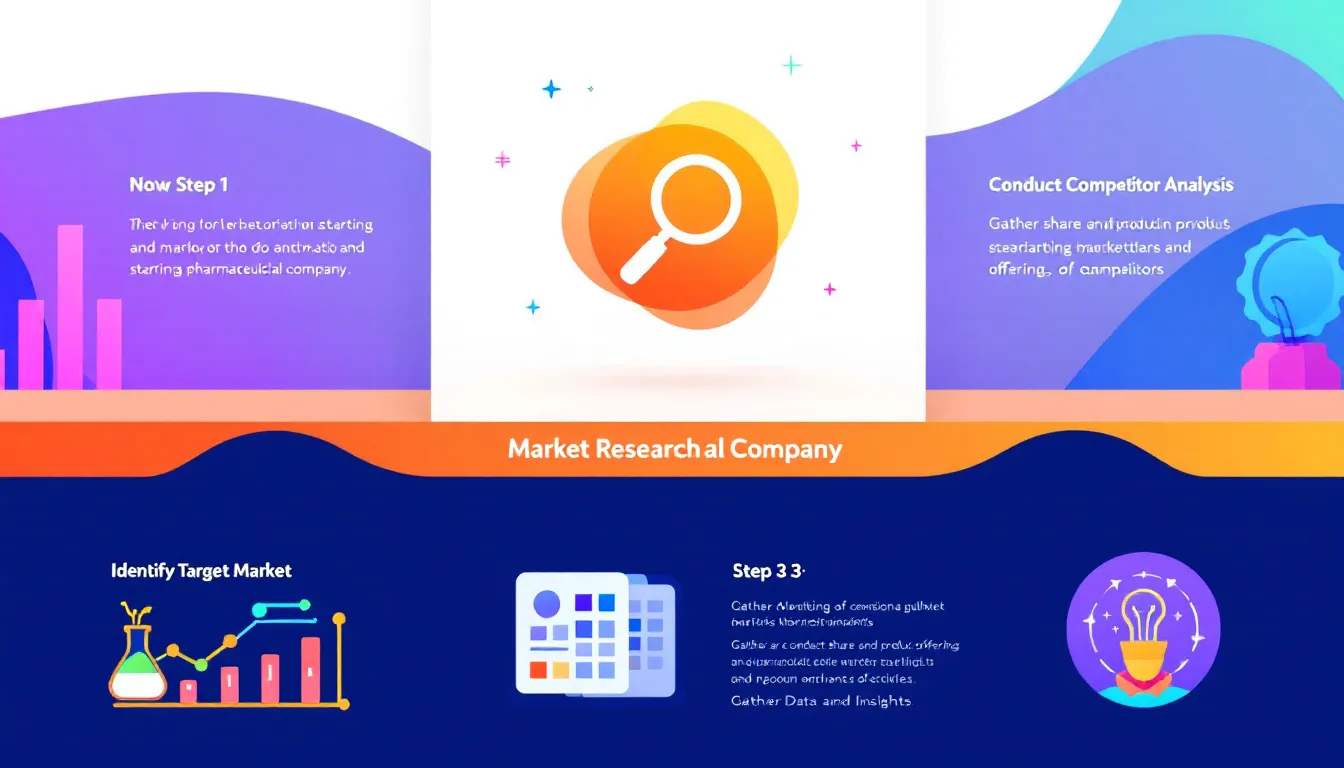If you want to know how do you start a pharmaceutical company, it involves conducting market research, developing a business plan, securing funding, and navigating regulatory requirements. This guide will cover these important steps and more to help you launch and grow a successful pharmaceutical business.
Conduct thorough market research to identify trends and unmet needs, reducing risks by up to 30%.
Develop a solid business plan outlining your business model, marketing strategy, and financial projections to attract investors.
Secure diverse funding sources, including angel investors, venture capitalists, and government grants, to support drug development expenses.

Starting a pharmaceutical company begins with identifying the right market. Conducting thorough market research can reduce risks by up to 30%, making it an essential first step. The global pharmaceutical market is projected to grow significantly, with emerging markets playing a key role. To capitalize on this growth, understand market trends, identify unmet needs, and analyze competitors’ strengths and weaknesses.
A comprehensive competitive analysis helps tailor a marketing strategy to your target audience by understanding both direct and indirect competitors. Grasping market demand and trends sets a strong foundation for developing a robust marketing plan for your pharmaceutical business.

A good business plan works like a map to help you succeed. It shows your business idea, how you’ll sell stuff, and the money plans you need to get people to invest in your company. Making new drugs can cost over $40 million to start, so you really need a clear, changing business plan. This plan should have a short summary, info about the drug industry, and simple marketing goals to follow.
People with money to invest want to see a strong business idea with a clear way to make money back. Your plan should show how you’ll handle the big costs of making drugs and how you’ll deal with other companies doing the same thing. Adding money predictions, backup papers, and a marketing plan that can change helps your business plan grow with your company.
Setting clear marketing goals, like getting more customers or making new products, will help you know what to do. This careful planning not only helps you get money but also helps you set goals you can really reach for your drug company.

Obtaining funding is a critical step in starting a pharmaceutical company. Potential funding sources include angel investors, venture capitalists, and partnerships with other pharmaceutical companies. Budgeting for initial capital should account for equipment, research, and clinical trial expenses to ensure efficient use of funds. Dividing the pharmaceutical development process into stages can help mitigate costs and risks, making funding management more effective.
Various funding sources are crucial for the financial stability and growth of your pharmaceutical startup. Analyzing projected budgets for upfront expenses helps determine the required funding to launch your pharmaceutical company.
Angel investors are individuals who use their net worth to support startups by providing capital in exchange for equity. Investment from angel investors is usually more flexible compared to traditional funding avenues, allowing for more adaptive business decisions and growth opportunities.
Venture capitalists typically engage in Series A funding and beyond, seeking a significant equity stake in exchange for their investment. They look for a robust business model and a clear path to return on investment, often providing not just funding but also strategic guidance and industry connections.
Various government programs offer grants specifically aimed at supporting drug development initiatives. These grants not only provide financial support but also encourage innovation and research within the pharmaceutical sector. Applying for government grants can be a strategic move for pharmaceutical startups looking to boost their drug development efforts without diluting equity.
Government grants support the advancement of drug development initiatives in the pharmaceutical industry. By securing these grants, companies can cover significant financial investments required in the early stages of development, ensuring that unmet needs in the market are addressed.
Picking the right business model is super important for your pharma company success. There’s lots of different models in the pharma business like product-based, platform-based, hybrid, and royalty income models – over 70% of successful pharma startups choose one of these 4 models!
The Product Based Model means you make medicine products and control everything from finding the drug to selling it. About 45% of big pharma companies use this model! The Royalty Income Pharmaceutical Company Model (RIPCO) focuses on early drug discovery and gets money upfront,milestone payments,and royalties on sales for their research work.
The Platform Business Model uses licensing of intellectual property for other companies to develop, mostly focusing on early drug discovery stages. According to industry data, this model has grown by 25% since 2020! A hybrid business model in pharma combines licensing technology and moving forward with molecule pipeline. Companies can switch from one model to another when good chances come up.
Choosing a model that matches your company goals and what the market needs is key for success that lasts. Research shows companies with aligned business models are 3x more likely to survive past the 5-year mark!
Compliance with regulations is a cornerstone of the pharmaceutical industry. The biggest challenge in bringing a product to market is compliance with FDA regulations. This involves adhering to Good Manufacturing Practices (GMP) and ensuring that all drug products meet the safety and quality standards set by the FDA in pharma manufacturing.
Quality assurance should begin early in the product development phase to establish robust protocols for research and production. Training employees on quality procedures and conducting regular audits are vital for maintaining high standards in pharmaceutical production.
A strong management team is essential to demonstrate the company’s potential for success. This team should highlight relevant experience and consist of members with diverse skills who can support one another. Hiring individuals with strong emotional intelligence can enhance team resilience and collaboration.
Aligning new hires with the company’s culture is crucial for maintaining a positive working environment. A successful pharmaceutical company team is one that can navigate the complexities of drug development and bring innovative treatments to market.

In the pharmaceutical industry, approximately 14% to 18% of annual sales are allocated to research and development, a figure significantly higher than in other sectors. This high investment underscores the importance of new product development (NPD) in the pharmaceutical sector. Companies often focus on therapy areas with high unmet needs, extending beyond traditional fields like oncology.
Success in NPD is influenced by the company’s capabilities, emphasizing managerial commitment and organizational learning. The ability to quickly bring products to market can provide a competitive edge, making it crucial to focus on the quality of new products.
Clinical trials are a critical step in drug development that test the safety and efficacy of new drugs before regulatory approval. These trials consist of multiple phases, starting with small-scale Phase 1 studies focused on safety and dosage.
Phase 2 trials usually enroll hundreds of patients to evaluate efficacy and side effects. Phase 3 studies involve thousands of participants, confirming treatment benefits and monitoring adverse reactions.
AI systems can streamline clinical trial processes by optimizing patient recruitment and monitoring through remote data collection, making the process more efficient.
A solid supply chain is vital for the success of your pharmaceutical company. Inefficient logistics can increase costs by 20%, making it essential to collaborate with specialized cold chain storage providers to mitigate risks related to product integrity and regulatory adherence. Temperature-controlled packaging is crucial for maintaining the efficacy of pharmaceutical products during transport.
Advanced technology solutions like real-time monitoring systems can enhance visibility and compliance throughout the supply chain. For more information on reliable supply chain solutions, consult www.chinacanaan.com, a leader in pharmaceutical equipment manufacturing and integrated solutions.

A marketing strategy involves considering the four P’s:
Product
Price
Place
Promotion
Pricing strategies must be tailored for different markets to ensure both competitiveness and profitability. Understanding specific audience segments is essential for selecting the right communication strategies.
Patient-centric marketing builds trust and addresses the specific needs of patients. Utilizing customer relationship management (CRM) technology is vital for effective pharmaceutical marketing. Continuous measurement and adjustment of marketing strategies based on key performance indicators are necessary for long-term success.
Technological advances are revolutionizing the pharmaceutical sector. Here are some key ways these advancements are transforming the industry:
Data-Driven Scientific Breakthroughs: Enhanced understanding of diseases through data analytics leads to innovative treatments. For example, Pfizer utilized data analytics to expedite the development of the COVID-19 vaccine, reducing the typical vaccine development timeline from years to mere months.
AI in Drug Discovery: AI technologies play a crucial role by analyzing vast biological datasets to identify potential drug targets efficiently. A notable example is Insilico Medicine, which used AI to discover a new drug candidate in just 46 days, significantly faster than traditional methods.
Machine Learning for Drug Interactions: Algorithms can predict drug interactions and optimize candidates, reducing the need for extensive animal testing. For instance, Atomwise uses AI to predict the binding of small molecules to proteins, expediting the drug discovery process.
Personalized Medicine: AI enhances personalized medicine by leveraging real-world patient data to create more effective treatment plans. IBM Watson Health has partnered with various healthcare institutions to personalize cancer treatment plans based on individual genetic profiles.
These scientific and technological advances are paving the way for a new era in medicine, offering more efficient and effective treatment options. The adoption of AI in drug discovery and development is projected to grow significantly, with the AI healthcare market expected to reach $45.2 billion by 2026, according to Grand View Research.
Scaling your business involves adopting a model that aligns with your growth strategy and market requirements. Launching new products requires a scalable business model that supports market entry. Efficiency innovations focus on enhancing operational capabilities within existing business models.
Sustaining innovations involve new products or services that build upon your current business model, while transformative innovations require significant changes and can lead to new growth opportunities. Key performance indicators like inventory turnover can help optimize operations effectively.
Collaborations with academic institutions can provide significant benefits for pharmaceutical startups. Strategic collaborations enhance financial resources and reduce risks. Joint ventures with research institutions can lead to significant funding opportunities and access to innovative R&D resources.
Many pharmaceutical companies and pharma companies partner with universities to drive innovation and enhance their research capabilities. Collaboration often results in beneficial knowledge-sharing between startups and established academic researchers, facilitating access to cutting-edge technologies and methodologies in drug development.
Quality assurance (QA) in pharmaceuticals ensures products consistently meet regulatory standards through systematic processes and rigorous testing. Quality Control (QC) focuses on testing and inspecting materials and products to confirm they meet specified standards. Continuous Improvement (CI) in QA involves ongoing enhancements to processes based on data analysis and feedback.
Risk assessments in QA identify potential issues related to raw materials and manufacturing processes. For more information on maintaining quality assurance in your pharmaceutical company, consult www.chinacanaan.com for their comprehensive solutions.
Starting a drug company in 2025 needs good planning, looking at what people want, and making a simple business plan. Getting money from different places, picking how you want to run things, and making sure you follow all the rules are big steps you need to take. Building a team of smart people, working on making good products, and getting through all the tests are really important if you want to make new medicines for people to use.
Setting up ways to get what you need, figuring out how to sell your stuff, using new tech, thinking about how to grow bigger, working with schools, and making sure everything is good quality are all key parts of running a good drug company. Now that you read this guide, you can better start your own journey in making medicines.
Conducting comprehensive market research to identify trends, competitors, and unmet needs is essential as the first step in starting a pharmaceutical company. This ensures that you have a solid understanding of the market landscape before proceeding.
To effectively secure funding for your pharmaceutical startup, consider approaching angel investors, venture capitalists, and exploring government grants, as well as forming strategic partnerships with established pharmaceutical companies. This multi-faceted approach will enhance your chances of attracting the necessary capital.
A solid business plan for a pharmaceutical company must include an executive summary, industry analysis, marketing strategy, financial projections, and a clear business model to ensure comprehensive strategy and effective communication of your vision. These components are essential for attracting investors and guiding your operations.
Regulatory compliance is essential in the pharmaceutical industry because it guarantees that products meet the stringent safety and quality standards required by regulatory bodies like the FDA, ultimately protecting public health. Adhering to these regulations is crucial for successful market entry and maintaining consumer trust.
Embracing technological advances, such as AI and machine learning, can significantly improve your pharmaceutical company by streamlining drug discovery and clinical trials while facilitating personalized medicine. This integration ultimately leads to more efficient and effective treatment options.




Manufacturing pharmaceutical products should always be taken seriously. That is, every process must follow the strictest and highest standards. This is the very reason why manufacturers prefer hiring an EPC contractor. Contractors working under EPC contracts will ensure the outcomes are of the best quality no matter what happens, focusing on the construction of the […]

Explore the importance of EPC contracts in pharmaceutical manufacturing. Learn how EPC works, its benefits, and why choosing an EPC contractor can guarantee project success with Canaan’s industry-leading equipment.

Discover how SCADA and PLC improve automation in the pharmaceutical industry. Learn their roles, benefits, and how Canaan’s advanced technology enhances efficiency and safety.